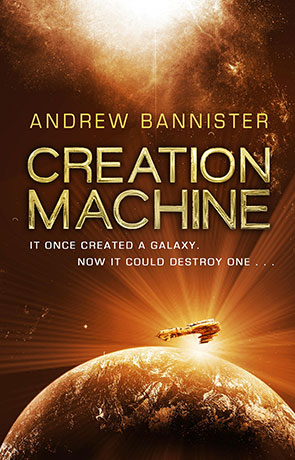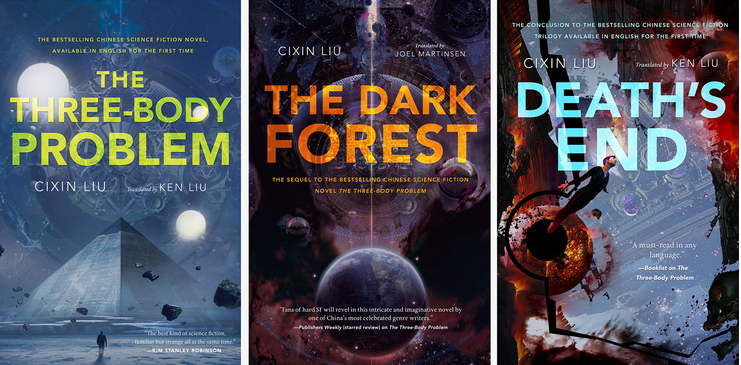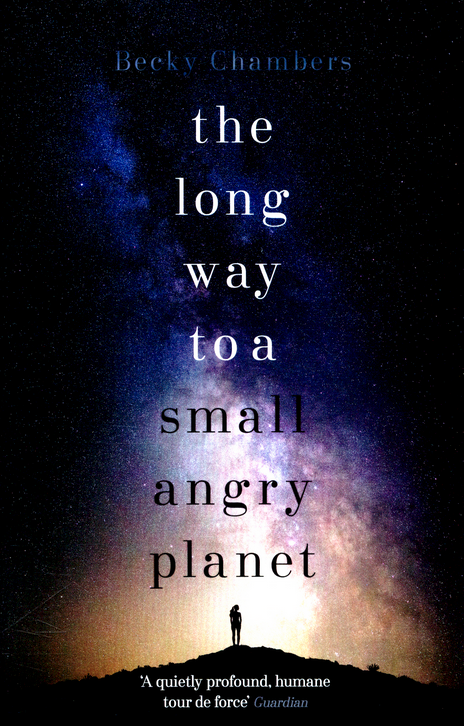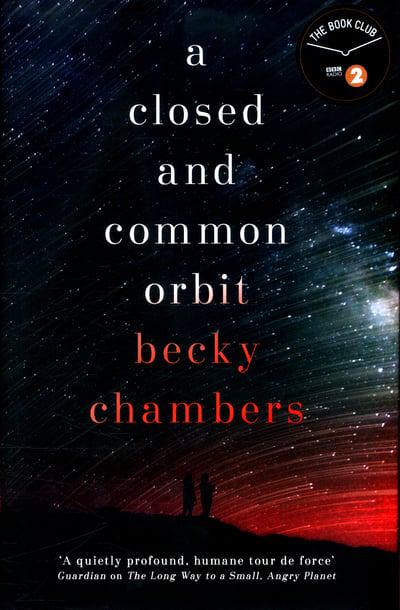Despite the best efforts of Richard Brody to deflate the experience, I love Rogue One. We’ve just got home, and I was surprised by how much time had passed: I hadn’t realised it was such a long film, so caught up was I by the perfect plotting, the heart-achingly redolent alien landscapes and pitch-perfect acting. Quite what Brody was on when he watched it, I’m not sure, but his off-target review had the happy effect of affording me that amazing, “This is actually rather wonderful!” feeling about ten minutes into the film: the opposite of a spoiler; an accidental enhancer in which I saw the strengths of a superb Hollywood movie through a scepticism built on a critic’s failure to understand what he was watching.
Brody’s greatest failing is shared by a number of reviewers of popular cinema: he treats the film as a valueless text, a technical exercise whose success or failure rests on its performance as spectacle and nothing more. He ignores the extent to which Rogue One is a political text, with its subject the injustice of military empires. I expect more of Brody but should not, really, be too surprised. The New Yorker is, after all, American. It does a good job of being metropolitan in an American way, but, to a non-American, it is loaded with that sense of American parochialism: the presumption that all that is worth considering is enclosed by two mighty oceans, and the rest of the world is just settings for American psycho-dramas. Part of George Lucas’ strength as an artist of relevance is his ability to see beyond the quasi-religious restrictions of his nationality and to criticise its fundamental failings: its arrogance, its brutality, its assumption of apartness and specialness.
I have, in fact, been a fan of Richard Brody for several years. He writes beautifully, and he is particularly strong at describing the visual experience of film; his technical appreciation leads his consideration of narrative, character and tone. I am a story-led viewer, so his contrasting perception has enriched my enjoyment of a number of films I might not otherwise have considered watching. He has, on occasion, taught me to see. However, I am not that interested in Hollywood spectacle films, so have tended to read his reviews of them uncritically, and without seeing the films. His avoidance of ideological criticism had not hit me.
Reading his review of Rogue One, and linking through to his other arguments about Star Wars, came as a bit of a surprise. I hadn’t understood the extent to which he is restricted by what I can only think of as ideological blinders: he loves the self-referential tendencies of Hollywood, but he is not prepared to make much of an ideological move outside the walls of the form.
So, when a film’s topic is cinema, as is the case with many ‘serious’ Hollywood films, he is happy to consider the philosophical and ideological implications of the movie. Early this year, for example, both he and I loved Hail, Caesar, and the following passage of his review entirely chimed with my enjoyment of that fine movie:
The American religion of Hollywood is also, in the Coens’ antic view, the essence of American power…of military might versus what ultimately will become known as soft power…The story of “Hail, Caesar!” is the story of that worship of secular images, but…the Coen brothers offer brilliantly ironic parallels between religious belief…and the realms of Hollywood.
Richard Brody, for The New Yorker
American cinema is a power, in other words; a global ideological force that doesn’t so much argue the case for American dominance as bludgeon the world with its assumption of that power. What Cody sees in the Coen Brothers’ view of Hollywood is knowingness: a clear satirical understanding of the role Hollywood plays in maintaining and repackaging a view of the ultimate goodness, validity and entitlement of right wing, white America. What he does not acknowledge in cinema is rebellion: the possibility that deviance from that view can possibly have any artistic validity.
And, in that blindness, he is entirely ‘on message’, as far as Hollywood’s soft power is concerned. Think of the way in which Hollywood has co-opted science fiction – a radically subversive literary genre in the nineteen fifties, sixties and seventies – and turned it into a cosy re-enactment of the militarist right wing mythos of American capitalism. Tom Cruise, the ultimate screen anti-presence, appears every half-decade in some ironed-out mega-epic that hoovers up all the latest devices of science fiction’s inventiveness and presses them into the service of a Nietzschean self-worship non-story in which the white man is always the victim and always the narrative focus, beautiful women (white, black, asian-doesn’t matter: they’re just devices) are the plot key, and daddy’s approval saves the world. Through the appropriation of its creativity, science fiction’s power to undermine and criticise the dominant culture’s ‘reality’ is rendered impotent, confused, and pathetically excluded, rather than vital, telling and radically marginal.
I have always thought of Hollywood as a pretty monolithic ideological structure and considered making distinctions within its output a bit of a fool’s game, but I am becoming less sure of that. White America is strangely blind to its own privilege and shamefully quiet about its abuses but that is not to say that it is as uniformly supportive of them as we might believe. Now, I’m not planning to defend Star Wars or George Lucas as beacons of racial justice, but I do believe that there is a serious argument to be made for his branch of Hollywood creativity representing something of a dissidence against the hegemony of the kind of self-focussed orthodoxy represented by his friend and contemporary, Spielberg. In John Baxter’s biography of Lucas, there is this passage which addresses the politics of what are now the grand seniors of Hollywood, but were, then, the enfants terrible.
Later, Schrader (screenwriter and director Paul Schrader) would bemoan the split between Lucas and Spielberg on one side, and Scorcese, Milius, and Coppola on the other, which started to open around 1975. “We came up full of piss and vinegar and politicization,” he said, “and we really felt that we were going to create a new brand of movies. Now, if you look at the film-makers of my generation – Walter Hill, Phil Kaufman, John Milius, George Lucas, Spielberg – by and large you see a kind of middle-age creeping in, a kind of establishment attitude and a lack of eagerness to take risks and challenge and upset.
Baxter John, George Lucas: An Autobiography, London, HarperCollins 1999, p191
Perhaps, in 1999, and for a really mainstream auteur like Spielberg, middle age and middle-of-the-road liberal consensus politics is an inescapable comfort zone. I know he has championed civil rights, but he also lobotomised the motivation of the two main characters in The Colour Purple, straightening them out and making their primary motivation daddy issues, instead of their condition as female victims of masculine oppression. Because of that, I haven’t watched Amistad, but, having read Roger Ebert’s review, I may put it on my viewing list. I don’t hate Spielberg; Schindler’s List moved me, although I am aware of its critics, but I suspect him of loving war as spectacle, and he more often disappoints than inspires.
“I dislike deeply ‘Schindler’s List,’ for many reasons,” he said. The Spielberg film is “much more easy to see than ‘Shoah,’ it is very sentimental.”
“It’s false,” he added, because it offers an uplifting ending. He also questioned the value of Mr. Spielberg’s underwriting of 105,000 hours of videotaped testimonies from concentration camp survivors and others in 56 countries, asking, “Who will see this?”
Claude Lansmann, filmmaker of Shoah.
Lucas, though less vaunted as an artist, gave birth to a saga in which the primary act of heroism is resistance against a militarist tyranny. He has continued to develop the theme of the moral primacy of democracy and justice over commercial power and mechanised military oppression through two Bush administrations, the establishment of the American permanent state of war and the drift into remote terror-war embraced by Obama. Now, as America faces her darkest hour of self-harm, he has handed over the reins to the corporate icon of optimistic capitalism and, instead of changing course, it has given us the most lucid hymn of praise to resisting the militarist tyrant yet, complete with ideological splits, and a rebellion Taliban who are not the bad guys.
In short, although Hollywood is an engine of ideological propaganda, it is also an arena of competition to shape that ideology, and I think Cody has dismissed the extent to which the ideology represented in the Star Wars saga deviates from the mainstream voice of Hollywood, and of capitalist establishment politics.
Let’s address Star Wars’ ethical weaknesses first. There were no black faces in the first Star Wars film, now known as Episode IV: A New Hope. If you take the Star Wars universe as a representation of America (and you should), it is a purely white America. That is not, in itself, an act of dishonesty. Lucas is a white American and in the film, he “…effectively created his childhood on film: a world of stern fathers, loving but distant mothers, and wayward but essentially good natured boys” (Baxter). Most white Americans do not know any black Americans nowadays, and that was doubly true in the mid 1970s. Suburban white America was his milieu and, therefore, the subject of his art.
There’s also the issue that Star Wars, despite being a magnificent work of the imagination, is not really the product of Lucas’ imagination so much as it is a skilful blend of other people’s original ideas. Frank Herbert, the author of Dune, was deeply wounded by Star Wars and considered a suit. Staunch defender of David Lynch’s awful adaptation of Dune that he was, he noted:
David had trouble with the fact that Star Wars used up so much of Dune. We found sixteen points of identity between my novel and Star Wars. That is not to say this was other than coincidence, even though we figured the odds against coincidence and produced a number larger than the number of stars in the universe.
Frank Herbert
I am terribly sorry for Herbert on this topic. He was shafted by circumstances. He wrote a novel of overwhelming power that turned space opera from the ‘juvenile’ sub branch of SF into its most vital and powerful element, and then saw his serious work overtaken by an exploitative repurposing into what he must have seen as a juvenile parody, as well as moneyed plagiarism. There are reasons for this, not least of which was that he failed to keep up the quality of the first book in the sequels. The second and thirdbooks, whilst at least coherent, are both quite boring to read, lacking the vividness and sensory power of the original, but I recently read the fourth and it is, frankly, ridiculous. Added to these woes is the fact that Dune almost made a cinematic masterpiece: Jodorowsky’s Dune has to be among the greatest of all unmade films. I have seen three of Jodorowsky’s movies, and he is a visual director in search of a story, tied too literally to Jungian hero quests to ever quite bring his amazing cinematic surrealism to full narrative life. The combination of that powerful novel, with its own surrealist undercurrents well tamed by Herbert’s extraordinary plotting and characterisation, and Jodorowsky’s joyous visual imagination, would have made a wonderful adaptation that could have left Star Wars to the kids, balancing out its influence.
However, it was not to be and we are left with Star Wars as the highpoint of space opera political parables, at least on screen. And, whatever my inner twelve-year-old might argue, Star Wars is far from perfect. For me, the most mysterious and involving of the films is The Empire Strikes Back, which Lucas still regards as an artistic failure, but I think Return of the Jedi is a tedious, disjointed film in which the interesting elements-Luke’s battle with his father/nemesis and Vader’s redemption in the Force’s triumph over the Dark Side, are overwhelmed by the kiddy-friendly action story from which it is divorced.
The Empire Strikes Back is about preparedness and the internal jihad: Luke is making himself worthy for the fight against the Dark Side’s temptations. It’s difficult to remember now the impact that the line, “No, I am your father”, had on us at the time. Before then, Vader was not a character, but a figure: evil incarnate, without face or motivation beyond the exercise of power. With that one line, he became greater, deeper, easier to stare at and consider. His motivation became a question worth pondering, and the Dark Side, as a choice of allegiance, became a much more accessible and frightening idea. A lot of plot devices took on lives of their own in that film, just as those of us who were on the cusp of our teens when we saw the first film, were reaching the age where existential questions were beginning to interest us.
In Return of the Jedi, Luke’s, Vader’s and the Emperor’s confrontation is too similar to the original duel/debate between Luke and Vader in The Empire Strikes Back; visually, rhythmically, emotionally and thematically. Disastrously, the first trilogy’s great climax is a bit of a bore, and the reconciliation between Luke and Vader, for me, failed to rise above standard Hollywood daddy issues, fascinating as seeing Vader’s face was. It was just a little too trite. I was glad when it was all over, even though the final shot of the cast smiling into the camera was just foul, like a betrayal of the operatic depth of the story to which the series had aspired, as if the director had realised that he had failed to reach the emotional tone he was aiming for and had put in an apologetic, “it’s only a kids’ film” shoulder-shrug image to cover his embarrassment.
Nevertheless, underlying the story, there was a constant, and that was the political environment: the ‘cartoon’ morality of which the critics make much dismissive noise was not a good-and-evil tale of obedient certainty, but a clear imperative to disobey tyranny. The baddies are not outsiders or criminal: they are the soldiers, the policemen, the leaders and lawmakers, and it is the rebellion who are breaking laws, hiding in paramilitary training camps, defying established authority.
And this brings me to Rogue One. It has many threads, and it is told as a montage of encounters with people who have found different routes to the same conclusion: that they are unable to live in peace with the established legal authority of their society. This ties in, in some sequences, with a long standing (and ethically and historically dubious) American myth: that of the defiant frontiersman, for whom all authority is to be evaded, if not defied. However, in the character of Saw Garrera, we have a rare depiction of politically engaged, ethical resistance, struggling with the consequences of the choice to defy injustice. In Forest Whitaker’s exceptional performance, I recognised what I have been struggling to understand in the faces of the dead men and women who have thrown themselves against the American empire over the past two decades, knowing that they could hope for nothing but death and torture as a result, but determined, nevertheless, to cause harm to the power that has oppressed their political freedoms, mocked their faiths, shattered their societies, and murdered their loved ones.
Is Gerrera a mujahadeen? The scenes of the ambush of an Imperial convoy in the streets of his planet’s capital city are too redolent of Afghanistan, Iraq or Palestine for anyone but the densest of viewers to not make the connection. There’s the sand, the close-packed sandstone buildings, the basic armaments of the resistance and the mechanised brutishness and arrogance of the powerful military. We are so used to seeing such sequences shot as triumphalist homages to heroic military sacrifice (Black Hawk Down, anyone?) that it took me a moment to realise what I was seeing: the stormtroopers have left behind their nazi-parrallel roots and have taken on the roles of the American Marine, the Israeli snatch squad; the British squaddy, exercising their power in the service of a resource-raping capitalist occupation.
And this, I think, must be why Richard Cody dare not look too closely at the politics of Star Wars, and is obliged to reduce it to a technical exercise and seek to diminish its power as popular text. Consider the absolutely required reverence for the soldier in Western capitalism: even nominally anti-establishment voices, such as American comedians, cannot speak of soldiers without a hushed genuflection to the ideas of ‘sacrifice’ and ‘service’. It is difficult to raise the question of how closely linked war is to profit in Western discourse: lawyers who were prosecuting British soldiers for rape and torture in Iraq (be warned: this is video of some uniformed shits giving their souls to Satan) have just been stitched up for alleged corruption and the inquiry shut down: the murderers have got away with it and it’s not a big news item. It is so much easier to simply go with the mainstream narrative: to pretend that soldiers are noble servants, making some sort of heroic sacrifice, rather than well-paid mercenaries in the service of an unjust power. When art, however obliquely, addresses such a massive and hegemonic silence of complicity, the best defence against its power is to simply belittle it, and that is how Richard Brody has bottled his duty.









